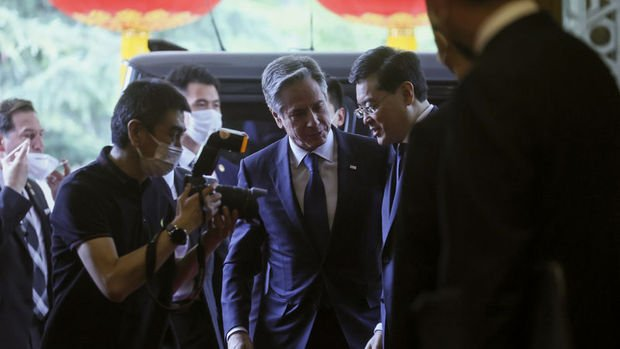US Secretary of State Blinken in Beijing for official visit
US Secretary of State Anthony Blinken met with his counterpart China Gang as part of his official visit to China. The US Secretary of State arrived in Beijing this morning for a two-day official visit. Blinken was welcomed at the airport by China’s Deputy Secretary of State for North American and Oceanic Affairs Yang Tao and US Ambassador to Beijing Nicolas Burns. Blinken is the highest-level official to visit Beijing since US President Joe Biden took office at the beginning of 2021 and the first US Secretary of State to visit China in 5 years. The last time he visited Beijing was in 2018 was by Secretary of State Mike Pompeo under Donald Trump. US President Joe Biden and Chinese President Xi Jinping decided that Blinken would visit Beijing during their meeting at the G20 Summit held on Bali, Indonesia, in November 2022, but the visit, planned for February, was canceled due to the crisis that a high-altitude Chinese balloon entered American airspace. Following his arrival in Beijing, Blinken met with his counterpart China Gang at the Diaoyutai State Guest House. The ministers’ meeting between the delegations lasted 5.5 hours. The US and Chinese delegations also met for a working dinner in the evening following the meeting. Emphasis on the Taiwan issue According to a statement from the Chinese Ministry of Foreign Affairs, Minister China Gang drew attention to the fact that China-US relations are at their worst point since the establishment of diplomatic ties, stating that this situation is not in line with the interests of the two peoples and the expectations of the international community. Stating that China sees its relations with the US within the framework of the principles of mutual respect, peaceful coexistence and win-win cooperation set forth by President Xi Jinping, China Gang emphasized that these principles should be the common spirit, goal and red line of the relations. Stating that they want to establish stable, predictable and constructive relations with the US, China Gang said, “We hope that the US will adopt an objective and rational view of China, work with China to protect the political basis of relations and handle unexpected isolated incidents in a rational, calm and professional manner.” The Chinese Minister underlined that the sides should make efforts to restore relations to a stable path in accordance with the content and spirit of the consensus reached by the US and Chinese leaders in their talks in Bali. China Gang emphasized that the Taiwan issue is China’s most fundamental interest, most important issue and the most obvious risk in China-US relations, and called on the US side to adhere to the one-China principle, comply with its obligations under the Three Joint Communiqués that form the basis of diplomatic relations, and its commitment to “not supporting Taiwan independence.” Keeping communication channels open In a statement from the US State Department, it was conveyed that Secretary Blinken emphasized the importance of keeping communication channels open and diplomacy in different issue areas in the meeting to avoid risks created by misperception and miscalculation. The statement, which stated that Secretary Blinken raised numerous issues of concern in the relations as well as opportunities for cooperation with China on transnational issues where interests overlap, said, “The Secretary of State made it clear that the United States will always defend the interests and values of the American people and work with our allies and partners to defend a free, open world and a rules-based international order.” The statement noted that Blinken invited China’s Gang to visit Washington to continue the dialogue. During the meeting, the sides agreed to continue consultations on the guiding principles in China-US relations, to address specific issues in the relations with a joint working group, and to promote interactions between the peoples in the fields of business and education. Blinken is expected to hold talks with China’s most senior diplomat, Director of the Office of the Central Foreign Affairs Commission of the Communist Party of China (CPC) Wang Yi, and President Xi Jinping tomorrow. Blinken is visiting Beijing at a time when economic and strategic competition between China and the US is increasing, existing problems and tensions continue unresolved, and mutual distrust prevails in relations. There are many problematic areas between the two countries, from the Taiwan issue to military tensions in the South China Sea, from economic and technological competition to human rights issues. While the visit is expected to reiterate the parties’ positions on the problematic areas, it is not foreseen that a full agreement will be reached in any area. However, the visit is important as the latest step taken in recent months to reestablish diplomatic communication that was interrupted following the balloon crisis. The balloon crisis and the breakdown of diplomacy On February 3, the US Department of Defense announced that a high-altitude intelligence balloon claimed to belong to China was detected flying over the US mainland and passing over some sensitive military facilities in the state of Montana, including nuclear warheads and long-range missile depots. China claimed that the balloon was a civilian aircraft belonging to the country, used for meteorological research, and that it had accidentally entered US airspace due to its limited control capability, drifting with the winds. While China’s statement did not satisfy Washington, Secretary of State Antony Blinken canceled his planned visit to China. On February 4, when the balloon was launched over the Atlantic Ocean on the orders of President Joe Biden, it was shot down by a fighter jet in US territorial waters. The Beijing administration protested the US for "forcefully interfering with a civilian drone." While diplomatic relations were largely cut off due to the crisis, US National Security Advisor Jake Sullivan and CCP Central Foreign Affairs Commission Office Director Wang Yi took steps to reestablish relations during their meeting in Vienna, Austria, on May 10-11.


